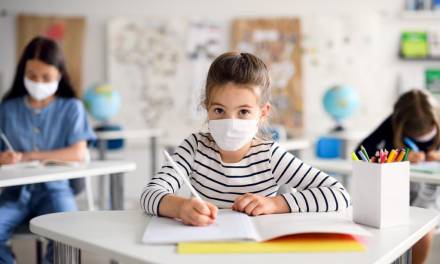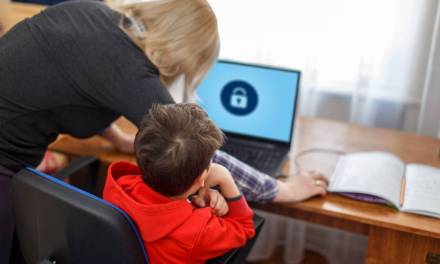Masks are now compulsory in school and communal areas – but could the new rule lead to further behavioural disruption.
The rules coincide with a new national lockdown in England, where non-essential businesses will close but schools will stay open.
Since schools reopened to all students in September there has been concern that behaviour had worsened. What could this mask rule mean for schools?
Department for Education: masks needed in all school areas outside the classroom
The Department for Education guidance states:
Face coverings should be worn by adults and children aged 11 and above when moving around the premises, outside of classrooms or activity rooms, such as in corridors and communal areas where social distancing cannot easily be maintained.
Schools should work to implement the guidance as soon as possible, the department said, but can have until Monday 9th November if they require additional time.
Until now, this requirement was only for schools and colleges where the Covid-19 alert was “high” or “very high”.
How is the mask decision likely to be received by students?
According to the United States Centers for Disease Control and Prevention:
Masks are recommended as a simple barrier to help prevent respiratory droplets from travelling into the air and onto other people when the person wearing the mask coughs, sneezes, talks, or raises their voice. This is called source control. This recommendation is based on what we know about the respiratory droplets play in the spread of the virus that causes Covid-19, paired with emerging evidence from clinical and laboratory studies that shows masks reduce the spray of droplets when when worn over the nose and mouth. Covid-19 spreads mainly among people who are in close contact with one another (within about 6 feet), so the use of masks is particularly important in settings where people are close to each other or where social distancing is difficult to maintain.
However, with rising negative behaviour is this decision likely to agitate students even more?
Students may have concerns of the benefits of wearing masks, when the increase use of them in the community has failed to prevent a second lockdown?
What about students that refuse to wear them? Are they going to end up in isolation?
Let us know your thoughts in the comments below.
EDClass can help support students who are self-isolating or disruptive
The EDClass virtual classroom provides access to more than 11,000 online lessons, live and recorded lessons and access to highly trained teachers – so education can continue even when school is closed or they can no longer attend. A tailored learning pathway means these lessons can be targeted to an individual’s needs and a tracking platform means teachers can log in to check progress and attendance.
The online platform has a proven track record of increasing engagement in education and reducing exclusion. Originally tasked with preventing 34 pupils from being permanently excluded in 2008, the platform has gone from strength-to-strength with a range of support for disenfranchised learners (including targeted behaviour lessons, and exciting games/puzzles).
Further, EDClass’ virtual classroom and highly skilled staff can address the issue of staff shortfall.
For a free demonstration click here.
For more information call 01909 568 338.









